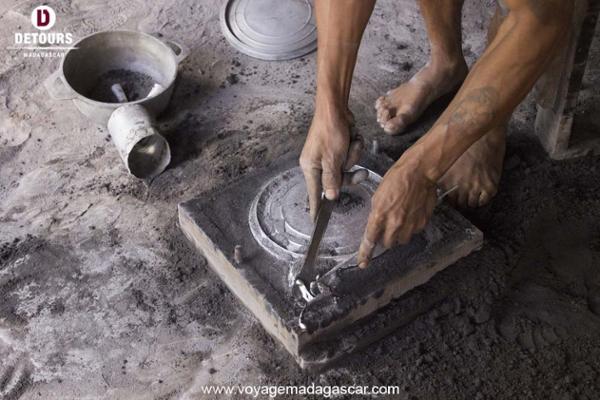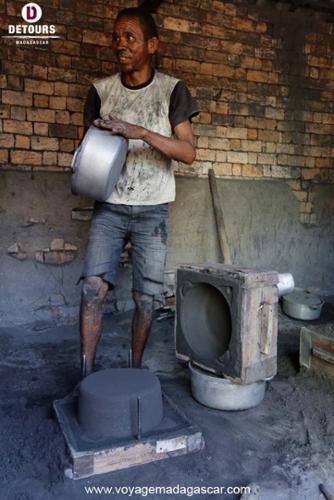
Aluminum art foundry in Ambatolampy: Malagasy craftsmanship
Most Malagasy households have aluminum pots and pans from Ambatolampy in their kitchens, which they primarily use for cooking. This town, located about 70 km south of Antananarivo along the RN7 highway, is synonymous with aluminum foundries—a unique and quintessentially Malagasy craft.
The origins of Ambatolampy’s renowned foundry

The Foundry of Randrianantoanina
Randrianantoanina, a native of Ambatolampy, established a foundry upon returning from the frontlines three years before the end of World War I. Inspired by what he had seen in Europe and the ruins of Jean Laborde’s foundries in Mantasoa, he introduced the technique of molding with laterite to Madagascar and, with his workers, crafted bronze bells.
His life story is cinematic: imprisoned in 1947 on suspicion of supplying arms to Malagasy insurgents, he escaped in 1949 and returned discreetly to Ambatolampy in 1951, where he introduced the first aluminum pots. Recognized with the Malagasy National Order during the First Republic, his legacy endures.
Alumada: excellence in Malagasy Aluminum Foundry
After Randrianantoanina’s death in 1993, his craft was carried on by his sons and many other workers he had trained. Today, the foundry, Alumada, is led by his granddaughter, Stéphanie Ramanantoanina, an artist-founder. The raw materials are meticulously sourced, consisting of extruded aluminum scraps from Europe, primarily food-grade white aluminum recycled from beverage cans.
This material is melted to create statuettes, ashtrays, unique decorative objects, and jewelry. Customizations such as text, company logos, lacquering, and packaging can be added to these personalized art pieces.
The crafting of aluminum pots and art objects
The famous aluminum pots
Visitors to Ambatolampy can tour the artisanal foundries to see how aluminum pots and other items are made. The most popular items are kitchen utensils: pots, pans, ladles, and spoons. The town is home to about a hundred small family-run workshops, where skills are passed down from one generation to the next.
Raw materials such as cans, bolts, and carpentry waste are melted down. The boiling liquid aluminum is then poured into manually crafted molds. Workers, unprotected and astonishingly skilled, work with incredible speed—one artisan can produce up to 50 pots per day.
Art objects made from recycled aluminum
Watching aluminum being melted and molded is always impressive. A brick furnace fueled by charcoal heats the metal to over 660°C. The mold, used only once, is made from a model placed in a wooden box filled with fine sand mixed with charcoal dust. While the mixture can be reused, the mold itself is single-use.
Molten aluminum is poured into the mold through a narrow conduit, and the piece is immediately cooled with water before being removed. The rough object is then polished to smooth and shine the surface.
Travelers are particularly fond of the resulting creations: zebus, lemurs, chameleons, baobabs, and more. These items are a quintessential Malagasy souvenir to take home from a trip to Madagascar.

